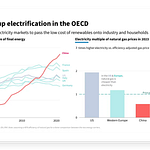Three news stories summarized & contextualized by analytic journalist Colin Wright.
Somalia asks peacekeepers to slow withdrawal, fears Islamist resurgence
Summary: Somalia’s government has asked the African Union Transition Mission in Somalia, which is a peacekeeping force of about 4,000 troops, to slow their withdrawal from the country, which is currently expected to be completed on December 31 of this year; around half that force is scheduled to be withdrawn by June, and the government is asking them to wait until September.
Context: The ATMIS is an African Union force, is largely funded by the EU and US, and is in Somalia to help the government fend-off extremist militants in the region, especially those aligned with al Shabaab; the government is concerned their own forces won’t be ready to fill in the gaps left by the ATMIS when they pull out, basically, and that could leave a power vacuum al Shabaab or another group could rush to fill; the head of the ATMIS has said there’s no definitive timeline for concluding negotiations regarding the withdrawal, and that everyone involved has committed to achieving sustainable peace and security in the area.
—Reuters
Greece introduces the six-day work week
Summary: A new law that comes into effect in Greece on July 1 will allow business owners in some sectors to assign their employees hours up to six days a week, if they deem it necessary, adding a 40% supplement to the employee’s daily wage if they are called in for a sixth day of labor.
Context: This is a contentious piece of legislation, as while it could help boost the wages of some hospitality, agricultural, and retail workers in particular, it’s generally not meant to increase the number of hours they work, but rather than number of total hours businesses are producing goods and services, and Greek workers already work more hours than those in any other European country, tallying an average of 41 hours per week (the pay they receive per hour is low by European standards, however); collective agreements have been frozen in the country for years, as the government has had to ask for three economic rescue packages, and has suffered through 15 years of recession and austerity measures, so this is generally being seen as another effort to shore things up at a moment of relative calm in that regard, making up for a lack of skilled workers by putting those who are available to work a little more, each week.
—Deutsche Welle
Gunmen kill 15 police officers and several civilians in Russia’s southern Dagestan region
Summary: Attacks by gunmen on two Orthodox churches, a synagogue, and a police post in two cities in the southern Russian republic of Dagestan on Sunday have left more than 15 people dead, according to local officials.
Context: These attacks occurred near-simultaneously, and the country’s Anti-Terrorist Committee has said the five confirmed gunmen have been killed, while the governor of the republic said six “bandits” were “liquidated”; no one immediately claimed responsibility for the attacks, though there was a report that a local official was detained because of his son’s possible involvement; another recent attack on a concert hall in Moscow, during which 139 people were killed, was initially (and without evidence) blamed on Ukraine, before the government admitted it was an Islamic State-linked group, and some reports suggest officials may try to link this new attack to Ukraine, as well, though there doesn’t seem to be any evidence that’s the case.
—The Associated Press
The 2024 US election is looking to feature the most “double-hater” voters on record, with around 25% of surveyed Americans saying they don’t particularly like either major candidate.
—Axios
$91.4 billion
Sum spent by the nine nuclear-armed countries on nuclear weapons in 2023, according to a new report by the International Campaign to Abolish Nuclear Weapons.
That’s about $3,000 per second, and is around $10.7 billion more than was spent in 2022.
—VOA News












Share this post